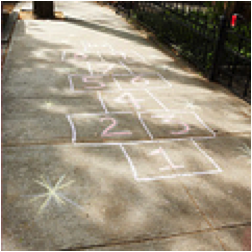Playing outside is one of those rites of childhood that gets championed by people who feel kids today spend too much time in front of a screen. Fresh air, exercise, creative activity — that’s all great, sure, but for those of us who have children with special needs, outdoor play can be problematic. Medical issues and physical disabilities can make the great outdoors inhospitable and unaccommodating for some youngsters. And even if your child can theoretically interact with the environment without risk, developmental and behavioral issues can lead your child to find dangerous circumstances in even the most benign playground settings. For many kids with disabilities, free outdoor play must give way to tightly supervised and structured activities, and that puts a big burden on Mom and Dad to come up with ideas for fun ways to get young bodies and imaginations moving. If responsibility for playtime falls on your tired shoulders, try these five ways to get some outdoor time for your child. 1 . Take a Walk It’s the simplest of outdoor activities, but it provides the structure and supervision that your child may need, while getting both of you out and moving. Pick a path through your neighborhood that’s appropriate for your child’s abilities, or find a park that has a good walking trail and try that. Make the walk less about cardiovascular fitness than letting your child interact with the outdoors. He or she may walk more slowly than you’d like, get more distracted, complain about tiredness sooner. Tailor your walking routine to your child’s abilities and interests, and do make it a routine, same time every day if you can. 2 . Do a Park Tour Does your town or area have a number of different parks? Make it a project to visit all of them. If you can, pick a time when they’re less likely to be full of swing- and slide-hogging kids. Try out the different playgrounds and brainstorm with your child what he or she enjoys or doesn’t. You may find a good place to make your regular playground stop, or gain a greater awareness of your child’s sensory issues and play preferences. This is a particularly good project to take on over the summer or on a school break. 3 . Check Your IEP If your chlld gets physical or occupational therapy, chances are there’s a list of things that the therapist is working on with your child. Are they working on ball throwing? Ball catching? Walking on a narrow balance beam, similar to the outer lip of the sidewalk? Pushing a big therapy ball? Crawling through a tunnel? Rolling? Swinging? Jumping? Talk with your child’s therapists to find out what techniques they’re using to strengthen these skills, and then make them part of your outdoor play repertoire. You’ll be reinforcing the work done in therapy while doing something that looks like fun. 4 . Make a Mess Have you been reluctant to try things like filling a bin with rice and letting your child dig in; topping a surface with shaving cream and letting your child smear it around; squirting some fingerpaint on a piece of paper and letting your child create something crazy? Outdoors is a great place to do those messy goopy activities, and hose both child and surfaces down afterward. Your child might also enjoy coloring on the sidewalk with big fat pieces of chalk, diggin in dirt and mud, creating with papier mache, or finding bits of rock and leaf and flower to glue to a piece of paper for a special art project. This is what the outdoors is for. 5 . Get In Sync The Out-of-Sync Child Has Fun and Raising an In-Sync Child by Carol Kranowitz both have lots of good ideas for outdoor play that strengthens childrens’ sensory processing abilities. Look through and find the ones that best address your child’s particular strengths and weaknesses — or just the ones that look manageable to you. Just as you got advice from therapists for good activities, share with those therapists which of these activities was most fun and effective with your youngster. Good ideas go both ways. By: Terri Mauro, Children With Special Needs Expert https://specialchildren.about.com/od/homebasedtherapies/tp/Play-Outside-With-Your-Child.htm







